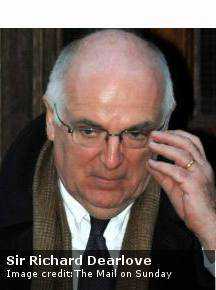by Joseph Fitsanakis
 The former director of Britain’s external spy service has hinted he might publish his personal account of the decisions that led to Britain’s entry in the Iraq War, if he is criticized in a public inquiry on the subject. Sir Richard Dearlove led the UK’s Secret Intelligence Service, known as SIS or MI6, from 1999 until his retirement in 2004. He is currently on sabbatical from his post as Master of Cambridge University’s Pembroke College, in order to research and author his autobiography. The memoir is believed to be largely preoccupied with the intelligence that led to the British government’s decision to enter the United States-led 2003 war in Iraq. Sir Richard had previously indicated that he intended to make his memoirs posthumously available as a resource to academic researchers. But in an email to British tabloid The Mail on Sunday, he hinted he would consider publishing his personal account if he finds himself criticized by the Iraq Inquiry. Known in Britain as the Chilcot Inquiry, after its Chairman, Sir John Chilcot, the Iraq Inquiry was commissioned by the British government in 2009 to investigate the executive decisions that led the country to participate in the invasion of Iraq. One of the inquiry’s many goals was to evaluate the intelligence provided by MI6 to the government of Prime Minister Tony Blair. There have been rumors that the inquiry’s declassified findings, which are scheduled for publication soon, are critical of MI6’s performance and place particular blame on Sir Richard’s role in the debacle. In his email to The Mail, the former MI6 director made clear he had “no intention, of violating [his] vows of official secrecy”. But he added that he would reconsider his decision to make his memoirs available to scholars only after his death “depending on what Chilcot publishes”. The core of Sir Richard’s dispute with Chilcot is said to center on the claim, propounded by the British government in 2003, that Iraq’s armed forces were able to fire chemical weapon missiles at British troops stationed on the Mediterranean island of Cyprus. This allegation, which found its way to the British press following a series of controlled leaks, largely informed the British government’s public argument in favor of joining the US war effort in Iraq. It later turned out, however, that MI6 had stressed to British government executives that the intelligence referred strictly to short-range battlefield munitions, rather than long-range weapons. Sources close to Sir Richard say he is adamant that the Chilcot inquiry should place the blame for the chemical weapons claim to Prime Minister Blair and his chief spokesperson at the time, Alastair Campbell.
The former director of Britain’s external spy service has hinted he might publish his personal account of the decisions that led to Britain’s entry in the Iraq War, if he is criticized in a public inquiry on the subject. Sir Richard Dearlove led the UK’s Secret Intelligence Service, known as SIS or MI6, from 1999 until his retirement in 2004. He is currently on sabbatical from his post as Master of Cambridge University’s Pembroke College, in order to research and author his autobiography. The memoir is believed to be largely preoccupied with the intelligence that led to the British government’s decision to enter the United States-led 2003 war in Iraq. Sir Richard had previously indicated that he intended to make his memoirs posthumously available as a resource to academic researchers. But in an email to British tabloid The Mail on Sunday, he hinted he would consider publishing his personal account if he finds himself criticized by the Iraq Inquiry. Known in Britain as the Chilcot Inquiry, after its Chairman, Sir John Chilcot, the Iraq Inquiry was commissioned by the British government in 2009 to investigate the executive decisions that led the country to participate in the invasion of Iraq. One of the inquiry’s many goals was to evaluate the intelligence provided by MI6 to the government of Prime Minister Tony Blair. There have been rumors that the inquiry’s declassified findings, which are scheduled for publication soon, are critical of MI6’s performance and place particular blame on Sir Richard’s role in the debacle. In his email to The Mail, the former MI6 director made clear he had “no intention, of violating [his] vows of official secrecy”. But he added that he would reconsider his decision to make his memoirs available to scholars only after his death “depending on what Chilcot publishes”. The core of Sir Richard’s dispute with Chilcot is said to center on the claim, propounded by the British government in 2003, that Iraq’s armed forces were able to fire chemical weapon missiles at British troops stationed on the Mediterranean island of Cyprus. This allegation, which found its way to the British press following a series of controlled leaks, largely informed the British government’s public argument in favor of joining the US war effort in Iraq. It later turned out, however, that MI6 had stressed to British government executives that the intelligence referred strictly to short-range battlefield munitions, rather than long-range weapons. Sources close to Sir Richard say he is adamant that the Chilcot inquiry should place the blame for the chemical weapons claim to Prime Minister Blair and his chief spokesperson at the time, Alastair Campbell.
IntelNews, July 26, 2013
